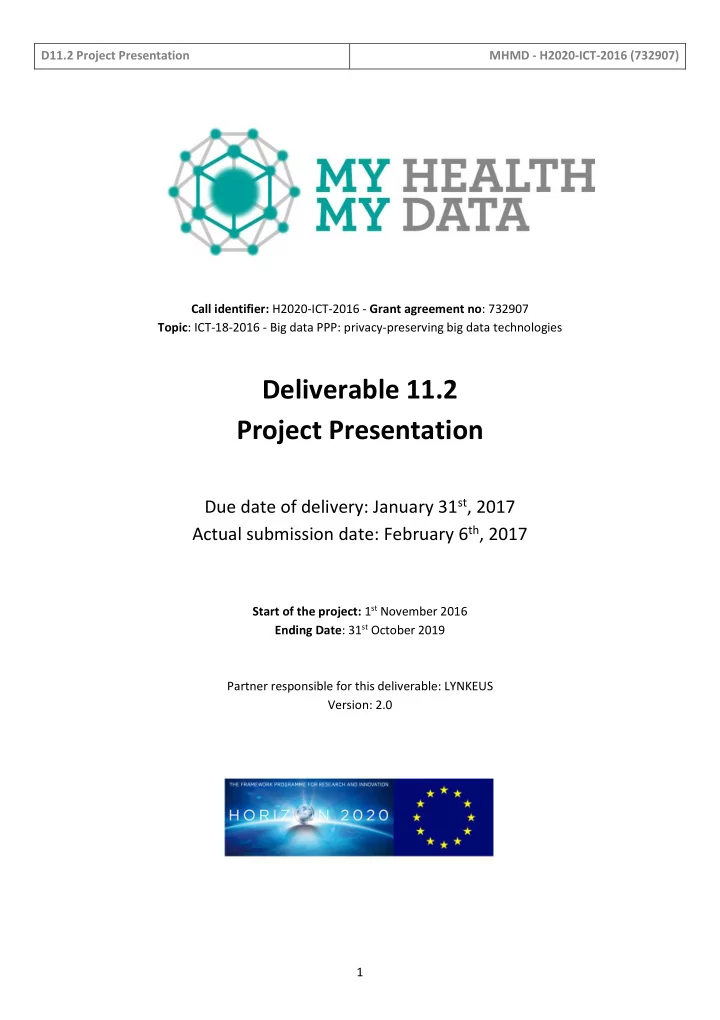

D11.2 Project Presentation MHMD - H2020-ICT-2016 (732907) Call identifier: H2020-ICT-2016 - Grant agreement no : 732907 Topic : ICT-18-2016 - Big data PPP: privacy-preserving big data technologies Deliverable 11.2 Project Presentation Due date of delivery: January 31 st , 2017 Actual submission date: February 6 th , 2017 Start of the project: 1 st November 2016 Ending Date : 31 st October 2019 Partner responsible for this deliverable: LYNKEUS Version: 2.0 1
D11.2 Project Presentation MHMD - H2020-ICT-2016 (732907) Dissemination Level: Public Document Classification Title Project Presentation Deliverable D11.2 Reporting Period Authors Anna Rizzo Work Package WP11 Security Nature Keyword(s) Document History Name Remark Version Date January 27 th Anna Rizzo First Draft 1.0 List of Contributors Name Affiliation Anna Rizzo LYNKEUS List of reviewers Name Affiliation Mirko De Maldè LYNKEUS LYNKEUS Edwin Morley-Fletcher 2
D11.2 Project Presentation MHMD - H2020-ICT-2016 (732907) Index Introduction ....................................................................................................................................................... 4 Project Objectives .............................................................................................................................................. 5 Project Timeline ................................................................................................................................................. 6 Project Structure ............................................................................................................................................... 7 Presentation Materials .................................................................................................................................... 10 Presentations ............................................................................................................................................... 10 Press release ................................................................................................................................................ 11 Flyer ............................................................................................................................................................. 12 Project website ............................................................................................................................................ 14 3
D11.2 Project Presentation MHMD - H2020-ICT-2016 (732907) Introduction This document contains the presentation of the project, as well as the presentation materials, and aims at introducing MyHealthMyData (MHMD) scopes and peculiar features. MHMD is intended to address the topical issues underlying the sharing, management and protection of personal health data in the EU context. Its goal is to develop the first open biomedical information network centred on the connection between organisations and the individual, aiming at encouraging hospitals to start making anonymised data available for open research through MHMD secure federated Infostructure, while prompting citizens to become the ultimate owners and controllers of their health data. MHMD profiles and classifies sensitive data based on their informational and economic value, and assesses the most suitable and robust de-identification and encryption technologies needed to secure different types of information, while still allowing advanced knowledge discovery through analytics and deep learning applications running on a growing amount of anonymised or pseudonymised data. The system will rely on the introduction of some key innovations, including: Blockchain: a digital ledger where information relating to the distributed storage of the health data is trimmed in hash-based language code, making it possible both to assign to each dataset a unique, fully traceable, digital Persistent Identifier (PID), and to associate it with metadata describing exactly what type of data are available, and referring to what cohorts of patients, while data transactions are continuously validated to the entire network of stakeholders, avoiding any possibility of fraudulent usage; dynamic consent: the possibility for individuals to provide different types of consent according to distinct potential data uses, taking control over who will access his/her data and for what purpose; personal data accounts: personal data storage clouds enabling individual access from any personal device through the blockchain in a probative, secure, open and decentralized manner; smart contracts: self-executing contractual states, based on the formalisation of contractual relations in digital form, which are stored on the blockchain and automate the execution of peer-to-peer transactions under user-defined conditions; multilevel de-identification and encryption technologies: advanced techniques for encoding and de- associating sensible data from the owners’ identity ( i.e. multi-party secure computation, homomorphic encryptions), while allowing analytics applications to leverage the information. 4
D11.2 Project Presentation MHMD - H2020-ICT-2016 (732907) Project Objectives 1. CITIZENS’ E MPOWERMENT, by Development of the dynamic consent interface, aimed at enabling data subjects to allow, refuse and withdraw access to their data according to different types of potential usage. Build-up of a blockchain-based software infrastructure in which institutional and individual data exchanges are governed by peer-to-peer relationships between all the stakeholders. Implementation of the personal data account , a personal cloud allowing data subjects for direct access to their whole clinical data from any personal device through the blockchain. Use of smart contracts to define permissions to access the data and assist data subjects in their right to access, erase, modify delete or even “be forgotten”. Analysis of the regulatory framework , and particularly of the EU General Data Protection Regulation entering in force in 2018, with regard not only to the current rules for processing health data and other personal information, but also with the aim of checking how the whole of MHMD Infostructure, ad in particular its blockchain and smart contracts systems, will be operationally applicable, representing an innovative challenge for the detection of new rules and best practices for uncovered processes, solutions and methodologies. Analysis of users’ behavioural patterns alongside ethical and cultural orientations , to identify hidden dynamics in the interactions between humans and complex information services. 2. DATA PROTECTION, by Application of the blockchain model, a resilient and decentralised secure control system to monitor and assess the legitimacy of data transactions and detect fraudulent activities in real time. Identification and system implementation of the most suitable and robust de-identification and encryption technologies needed to secure different types of information. Evaluation of the overall security of the system architecture by testing it through dedicated re- identification and penetration self-hacking simulations and public hacking challenges, performed on synthetic data sets. 3. DATA VALUE ENHANCEMENT, by Profiling and classification of sensitive data based on their informational, scientific and economic value . Implementation of normalisation services able to process, harmonize and semantically consolidate all authorized data allowing rapid merging of heterogeneous sources. Creation of a unique application programming interface (API) to facilitate lawful data access to all registered stakeholders with a user-friendly registration process , supporting development of a proper Big Data analytical framework . Exploring potential ways to make use of anonymised or pseudonymised data with advanced data analytics and patient-specific model-based prediction applications , accelerating discoveries, fostering technological innovation and improving clinical care. 5
Recommend
More recommend